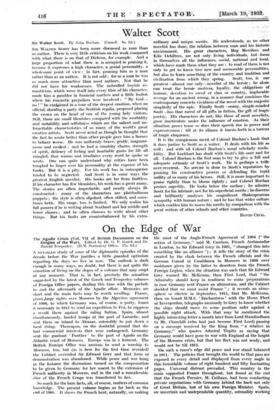Walter Scott
Sir Walter Scott. By John Bueluin. (Ceara. 9s. 64.1.) Sur Warren Scorr has been snore discussed as man than as author. There is very little criticism on his work compared with what there is on that of Dickens, for example. And a large proportion of what there is is occupied in praising it, because it expresses a high character, a genial personality, a wholesome point of view ; in fact, praising him as a man rather than as an author. It is not odd ; for as a man.he was so much more attractive than most authors. Not that he did not have his weaknesses. The unbridled boyish ro- manticism, which wove itself into every fibre of his character, made him a gambler in financial matters and a little foolish where his romantic prejudices were involved : " By God— no ! " he exclaimed in a tone of the deepest emotion, when an official, showing a party the Scottish regalia, proposed placing the crown on the head of one of the young lady visitors. Still, those are small blemishes compared with the morbidity and instability and selfishness which are the salient and un- forgettable characteristics of so many of the world's great creative artists. Scott never acted as though he thought that the fact he wrote better than other people gave I • a licence to behave worse. Ile was uniformly brave, gentle, magnani- mous and modest : and he had a sunshiny charm, strength of spirit, delicacy of feeling and insatiable gusto for life all mingled, that warms and irradiates every word he spoke or wrote. One can quite understand why critics have been tempted to linger over his personality at the expense of his books. But it is a pity. For his work has in consequence tended to he neglected. And Scott is in some ways the greatest English novelist. His hookS are far froth faultless. If his character has few blemishes, his work has a great many. The stories are often improbable, and nearly always ill- constructed : many of the characters are platitudinous puppets ; the style is often slipshod, often stilted, and some- times both. His range, too, is limited. We only realize his full powers if he is writing about Scotland and her middle and lower classes ; and he often chooses to write about other things. But his faults arc counterbalanced by his extra- ordinary and unique merits. He understands, as no other novelist has done, the relation between man and his historic environment. His great characters, Meg Merrilees and Edie Ochiltree, are not only living individuals, but ..focus in themselves all the influences, social, national and local, which have made them what they are ; to read of them is not only to get to know two new and memorable personalities; but also to learn something of the country and tradition and civilization from which they spring. Scott, too, is our greatest—almost our only—novelist of the heroic ; he alone can treat the heroic motives, loyalty, the obligations of honour, devotion to creed or clan or country, implacable revenge for an ancient wrong, in a mounter that combines the contemporary concrete vividness of the novel with the majestic simplicity of the epic. Finally Scott--sunny, simple-minded Scott—has that rarest of all gifts in fiction, the gift of tragic poetry. His characters do not, like those of most novelists, grow inarticulate under the influence of emotion. As their situation grows tense so does their speech rise in power and expressiveness ; till at its climax it bursts forth in a torrent of tragic. eloquence.
It is the conspicuous merit of Colonel Buchan's book that it does justice to Scott as a writer. It deals with his life as well ; and with all Colonel Buchan's usual scholarly reada- bility. But Lockhart_has dealt with Scott's life once and for all. Colonel Buchan is the first man to try to give a full and adequate estimate of Scott's work. He is perhaps a trifle over-reverent- No: service is done to Scott's reputation by praising his constructive powers or defending the tepid nullity of so many of his heroes. Still, it is more important to, praise rightly than to blame rightly ; and Colonel Buchan praises superbly. He looks below the surface ; he admires Scott for his intrinsic, not for his superficial merits ; he discerns and brilliantly analyses his magnificent Shakespearean sympathy with human nature ; and he has that wider culture which enables him to assess his merits by comparison with the great writers of other schools and other countries.
DAVID CECIL.






































 Previous page
Previous page